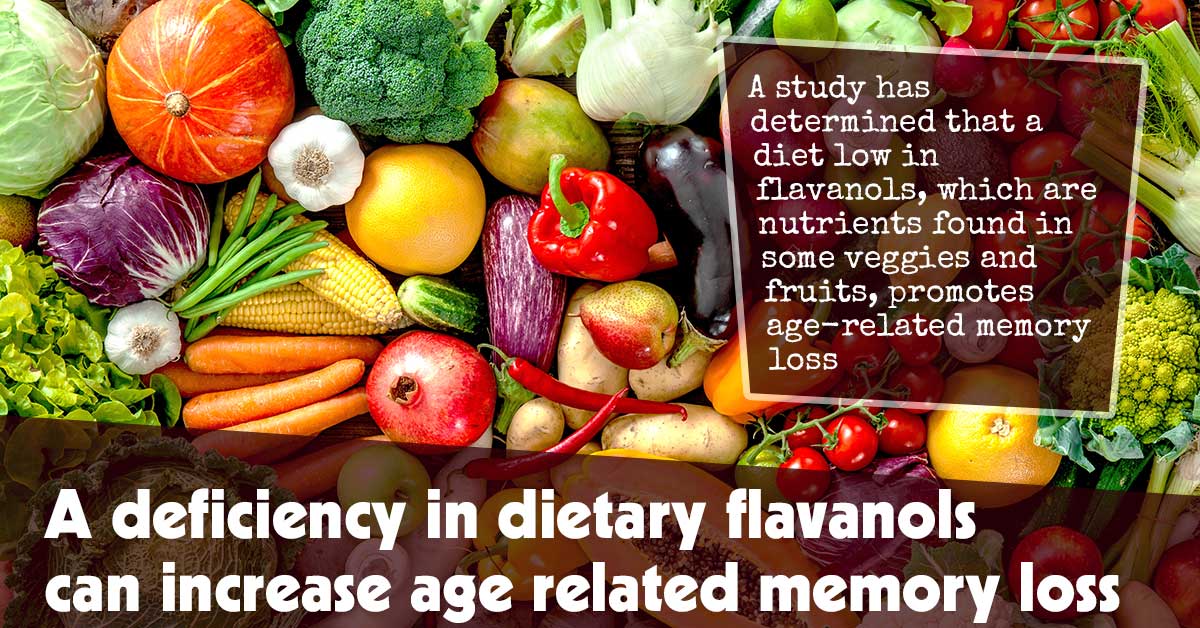A study has determined that a diet low in flavanols, which are nutrients found in some veggies and fruits, promotes age-related memory loss.1✅ JOURNAL REFERENCE
DOI: 10.1073/pnas.2216932120
Researchers determined that flavanol consumption in older individuals tracks with test scores intended for detecting memory loss as a result of normal aging and that replenishment of these dietary components in individuals older than 60 who are mildly flavanol-deficient improves test performance.
The improvement in individuals with low-flavanol diets was significant and making use of supplements or flavanol-rich diets for improving cognitive function in older individuals could be a possibility.
The results also support the notion that the aging brain needs certain nutrients for ideal health, just like the developing brain needs certain nutrients for optimal development.
This study builds on over 15 years of research connecting age-related memory loss to alterations in a particular region within the brain’s hippocampus known as the dentate gyrus, an area that’s essential for learning new memories, which showed flavanols improving function in this brain area.
Other research in mice has revealed that flavanols, especially a bioactive substance found in flavanols known as epicatechin, improved memory by boosting neuron and blood vessel growth in the hippocampus.
The researchers then tested flavanol supplements, with 1 small study establishing that the dentate gyrus is associated with cognitive aging. A 2nd, larger study established that flavanols enhanced memory by acting selectively on this area of the brain and impacted individuals starting with a poor-quality diet the most.
The current study was developed to test the effect of flavanols in a much bigger group and take a look at if flavanol deficiency promotes cognitive aging in this brain region.
Over 3,500 otherwise healthy older individuals were randomly allocated to get a daily flavanol supplement pill containing 500 mg of flavanols, which included 80 mg epicatechins, or a placebo pill for 3 years.
A survey was completed by all participants at the start of the study that evaluated diet quality, which included foods proven to be high in flavanols. A variety of web-based activities were then carried out in their own homes to evaluate the kinds of short-term memory managed by the hippocampus. After years 1, 2, and 3, the tests were repeated.
Urine samples were also provided by over a 3rd of the individuals allowing a biomarker for levels of dietary flavanols to be measured before as well as throughout the study. The biomarker provided a more accurate way of establishing if flavanol levels corresponded to cognitive test performance and making sure that individuals were adhering to the regimen they were allocated.
Levels of flavanols varied slightly, although there were no severely flavanol-deficient individuals. Flavanol supplementation was beneficial to individuals with mild flavanol deficiency.
There were only slight memory score improvements for the group that took the daily flavanol supplement, the majority of whom were already consuming a healthy diet with an abundance of flavanols.
However, by the end of the 1st year of flavanol supplementation, individuals who had consumed a poorer diet and who had reduced baseline flavanol levels saw an increase in their memory scores by 10.5% on average in comparison to placebo and 16% in comparison to their baseline memory. The improvement seen at 1 year was sustained for a minimum of 2 more years.
The study results indicate that flavanol deficiency promotes age-related memory loss given that consumption of flavanols is associated with memory scores and supplementation with flavanols improved memory in individuals who were flavanol-deficient.
The study results are in line with the results of another study, which observed that flavanol supplements didn’t improve memory in individuals with a variety of baseline levels of flavanols. The previous study didn’t examine the effects of flavanol supplementation on individuals with low and high levels of flavanols individually. What both studies indicate is that flavanols do not affect individuals without a flavanol deficiency.



